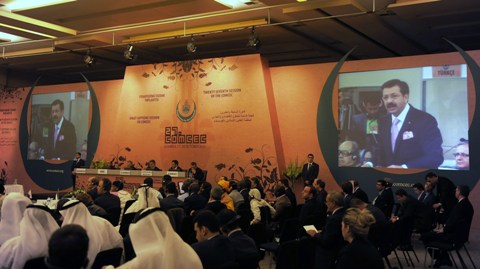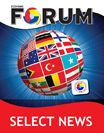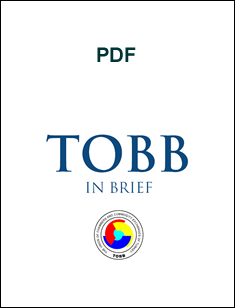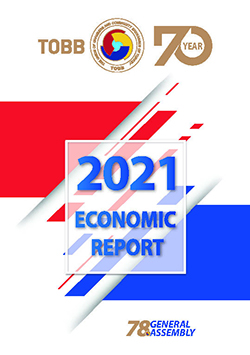Income justice is collateral for peace, development and stability

22.10.2011 / İstanbul
Speaking at the 27th İSEDAK Meeting held at the Istanbul Congress Center, TOBB President M. Rifat Hisarcıklıoğlu, speaking about the importance of income justice, said “While our neighbor right next to us is struggling with famine, while children in Somalia are dying from hunger, we cannot live in peace in our palace of glass.”
The “27th Economic and Commercial Cooperation Standing Committee (İSEDAK) Meeting” took place in Istanbul with the attendance of the President of the Republic of Turkey, Abdullah Gül. Speaking at the meeting TOBB President M. Rifat Hisarcıklıoğlu stated that the income disparity between Islamic countries is that the richest is 220 times richer than the poorest, saying, “We, as the business world, are very distraught by this. None of us can account for this when all are judged in the afterlife.”
Hisarcıklıoğlu stated that the understanding of private-public sector partnership, entrepreneurial freedom, religious and conscientious freedom, freedom of expression has great impact on and contributes greatly to the transformation and change of the Turkish economy. M. Rifat Hisarcıklıoğlu reported that these three key concepts are the driving force behind the changes in social, political and commercial life.
Stating that these main concepts have grown their roots into the very core of the economic structure and that commercial activities take place around them, Hisarcıklıoğlu said that, as countries situated in an Islamic geography, they have not been able to take full advantage of the emerging new world order following the collapse of the Soviet Union and that they’ve missed the advantages presented by this process.
- “The rich have become richer; the poor, poorer”
TOBB President Hisarcıklıoğlu stated that the world trade volume has increased to 16 trillion dollars in 2010 from 3 trillion in 1990 and that despite the general increase in prosperity, the number of underdeveloped countries has increased to 48 in 2011 from the 21 in 1971 instead of decreasing. Hisarcıklıoğlu stated that the rich have become richer; the poor, poorer.
Stating that a similar trend was also observable in the member states of the Organization of the Islamic Cooperation (OIC), M. Rifat Hisarcıklıoğlu said:
“First of all, 21 of the 48 least developed countries are unfortunately members of the OIC. The scale of the development gap between the richest and the poorest Islamic countries is like unto a chasm. According to SESRIC data, the richest Islamic country has 220 times the income of the poorest.
We, as the business world, are distraught by this. None of us can account for this to divine justice. While our neighbor, our brother, struggles with famine, while children die from hunger in Somalia, we cannot live in peace in our palace of glass. We must ensure income justice. Income justice is collateral for peace, development and stability.”
- “Make it possible for us to trade”
Stating that the world’s economy has been reshaped after the crisis of 2008 and that a new economic order has been established where the source of prosperity is commerce, entrepreneurship and production.
“We don’t have the luxury of missing this new structuring,” said Hisarcıklıoğlu and stated that the prosperity of natural resources do not make the people richer; commerce, entrepreneurship and production does.
TOBB President Hisarcıklıoğlu stated that the commercial performance of countries was at a disturbingly low level; that, according to SESRIC data, their share of world trade percentages does not exceed 10.5, “We actually fail to pass muster regarding trade between ourselves as well. Our intra-organization trade for 2010 is only 17% of our total trade. I request, as a businessman, that you make it possible for us to trade. Let us trade more. Remove the obstacles that prevent us from trading and investing. Let’s put the TPS-OIC Agreement, which has been on the ISEDAK agenda for while now, into effect.”
- “Her Excellency Hatice was also a woman entrepreneur”
TOBB President M. Rifat Hisarcıklıoğlu stated that Turkey has experience in opening up to international trade stated that competition brings about quality; quality brings about more production, employment, commerce and prosperity; prevents monopolization and ensures a system where not the state, but the real entrepreneurs prosper.
Stating that the public needs to be presented with the freedom of entrepreneurship, freedom of expression and public-private partnerships to the fullest, Hisarcıklıoğlu said, “Without such freedoms, we will not be able to find the enterprising spirit or entrepreneurs to invest in the future and take on risks. We must create an enterprising middle class. The cement of a country’s development, prosperity, unity and solidarity is the entrepreneurial middle class.”
Hisarcıklıoğlu stated that prosperity is not possible when only half of the human resources are utilized, that the middle class is made up of not only men but also women and went on to say:
“We must, generally speaking, remove the obstacles that prevent women’s entrepreneurship. In this regard we should follow the example of Our Revered Prophet. I’m sure all of you are aware that the wife of Our Revered Prophet, Her Excellency Hatice was a woman entrepreneur. Why, then, do we not enable our daughters to help us make our society more prosperous? This is very saddening but I will emphasize this here. According to SESRIC data the total production share of the 57 OIC member countries is less than both Germany and Japan.”
- “Lift visa limitations”
Stating that they are ready to share their experience of developing the private sector and entrepreneurship, Hisarcıklıoğlu said, “We are conducting capacity increase programs aimed towards Islamic countries which emphasize a strong, working, service providing, entrepreneurship supporting Commerce and Industry Chamber system. Likewise we are also enacting programs that support the betterment of the investment environment and share our experiences of organized industry zones, transportation and commodity exchanges.”
Hisarcıklıoğlu stated that Islamic countries need to remove the obstacle of visas for the business sector and to bring into effect the TPS-OIC Agreement in order to increase trade between Islamic countries; to establish an arbitration system between Islamic countries under the Islamic Chamber to facilitate and encourage commerce and investment as well as bettering the transportation infrastructure and harmonizing customs procedures.
- President of the Republic of Turkey, Abdullah Gül
In his speech at the meeting, President of the Republic of Turkey, Abdullah Gül said, “The social movements occurring in our geography today are indicative that we are undergoing a period of irreversible change. What needs to be done is not to resist the change but to pioneer it, to realize the wishes of our people and the requirements of our age via developing the political, social and economic reforms, reconciliation and dialogue.”
President Gül went on to say, “As the international tourism sector becomes more competitive, ensuring dialogue and cooperation with the private sector would increase the quality of service regarding tourism and strengthen its ability to compete, increasing the share of our country in the international tourism market.”
On the subject of agriculture, President Gül said, “I view the advances in these sectors as promising. However I am of the opinion that we need to expend more effort to deepen our cooperation in these matters.”
Gül stated that he found the efforts in the private sector to increase cooperation to be important. Stating that many in the Islam world suffer from famine and malnutrition, he said, “In recent years, the situation in Africa has become direr as a result of the drought, pushing many into hunger. Many aid campaigns have been undertaken in Turkey to address this tragedy, totaling in 350 million dollars worth of aid.”
Gül also touched on the problems of the Islam world, saying, “We, as Turkey, are continuing support for underdeveloped countries on various international platforms in order to raise awareness to the troubles of underdeveloped countries.
- OIC Secretary General Ekmeleddin İhsanoğlu
Organization of Islamic Cooperation (OIC) Secretary General Ekmeleddin İhsanoğlu stated in his speech that intra-OIC trade has increased from 14.5% in 2004 to 17.03% in 2010, “If this trend continues, the goal of 20% intra-OIC trade, set in the 10 year action plan of the OIC, will be achieved by 2015.
It is estimated that the number of people suffering from famine and malnutrition in OIC countries is around 230 million, 90% of the world’s children suffering from growth disorders are living in OIC countries. It is also saddening that our member countries need to close a gap of 40 billion dollars’ worth of food per year. This situation is exacerbated by the increasing expenses of importing petroleum and energy.”
Your message has been sent
Thank you |




